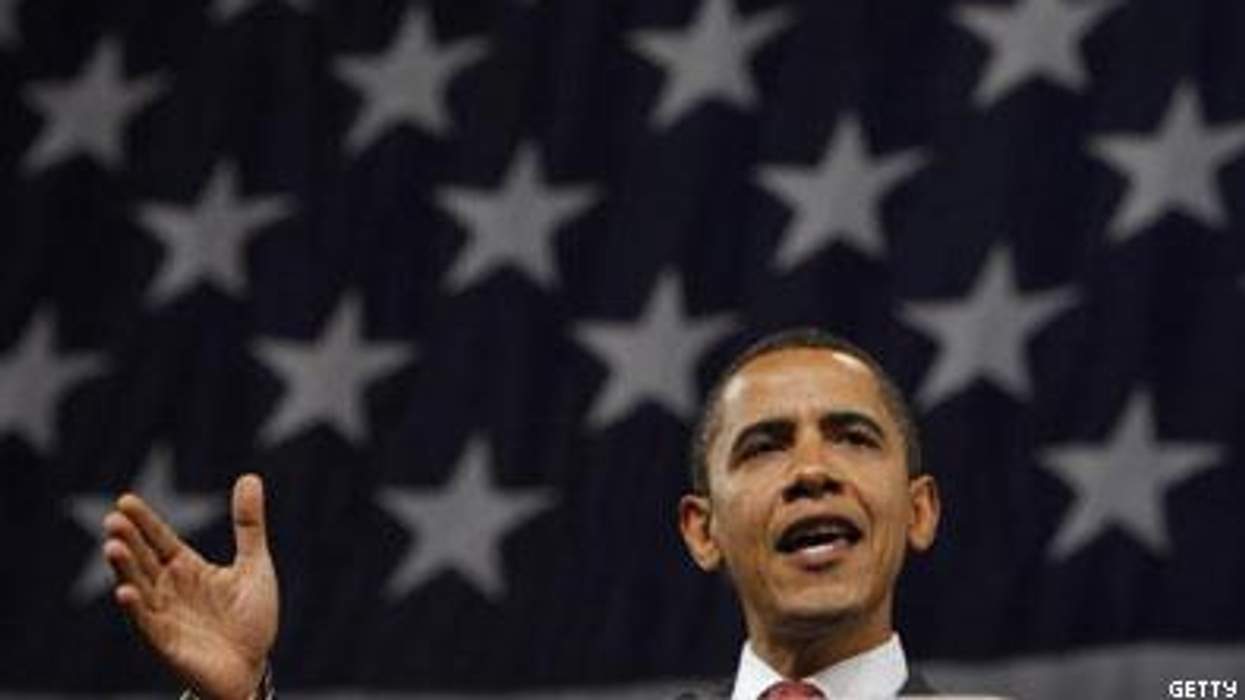The Obama
campaign is sticking with the issues this week. After losing
last week to a full-bore discussion of Sarah Palin and
lipstick and pigs (not necessarily in that order),
Sen. Obama has spent the week driving home messages
about the dire economy in his speeches while his surrogates
reached out to interest groups one by one, swing state by
swing state with LGBT concerns resting right at the
nexus of both.
Not only did the
campaign hold a conference call with reporters Wednesday
designed to remind the LGBT community that Sen. Obama backs
repeal of the military's "don't ask, don't tell"
policy, the Illinois senator finally granted an
interview with the Philadelphia Gay News that was set
to hit stands Thursday.
Among other
things, he hit the military theme again, telling PGN
he would not use an executive signing order to
overturn the ban.
"I want to make
sure that when we reverse 'don't ask, don't
tell,' it's gone through a process and
we've built a consensus or at least a clarity
of that, of what my expectations are, so that it
works," Obama said. "Although I have
consistently said I would repeal 'don't ask,
don't tell,' I believe that the way to
do it is make sure that we are working through a
process, getting the Joint Chiefs of Staff clear in terms of
what our priorities are going to be. That's how we
were able to integrate the armed services to get women
more actively involved in the armed services."
In an interview
earlier this year, Sen. Obama told The Advocate that
he would not use support for repealing the ban as a
"litmus test" for choosing his Joint Chiefs of Staff.
The PGN
interview could be considered a PR move of sorts for
Sen. Obama in a battleground state where he may have
ruffled some LGBT feathers. During the heated primary with
Sen. Hillary Clinton, the Obama campaign declined to
speak with PGN, prompting publisher Mark Segal to run
the paper's interview with Sen. Clinton alongside a
blank space where Sen. Obama's interview would have
gone. Pennsylvania's 21 electoral votes are considered
critical to Democrats in November -- many pundits say Obama
cannot win the election without winning the state and recent
polls show him in a dead heat with John McCain there.
The campaign also
dispatched Vice Presidential nominee Sen. Joe Biden,
who hales from Scranton, to Pennsylvania earlier this week,
mainly to court white blue-collar workers, a
demographic that helped deliver the state to Sen.
Clinton during the primary, and Catholic voters, who have
been getting a barrage of messages from conservative bishops
warning them against voting for candidates who show
support for abortion rights (i.e. Barack Obama and Joe
Biden).
While the
military served as a vehicle for wooing LGBT voters this
week, elsewhere the Obama campaign happily pivoted to
the economy after news that financial firm Lehman
Brothers collapsed and the Federal Reserve bailed out
insurance behemoth American International Group.
Even as former
Federal Reserve chairman Alan Greenspan said last Sunday
that the country was in the worst economic shape he had ever
seen, John McCain came out Monday morning saying that
he still believed "the fundamentals of our
economy are strong." The McCain campaign made several
attempts later in the day to re-frame the Arizona
senator's comments, but the Obama camp, clearly
viewing the statement as a gaffe, didn't waste any
time releasing an ad that posited in black and white text,
"How can John McCain fix our economy if he doesn't
understand it's broken?"
As a candidate
who has admitted that the economy is not his strong suit,
McCain and his spokespeople would seemingly rather get back
to discussing national security, Gov. Palin's lipstick
or almost anything else.
McCain's New York
chairman, Edward Cox, attending a Log Cabin Republican
event Tuesday, told The Advocate that McCain
would carry New York (he pulled within five points of Obama
in a Siena College poll this week) and win the
election overall -- but not based on fiscal know-how.
"This is a
national security election, the first one since 1988. If
it's a domestic election, it's a partisan election. People
get very partisan when they're fighting over domestic
politics," Cox said. "We've got an unpopular war out
there and we've got issues around the world. That
raises things to a different level. People are looking for a
President who will best protect and defend the people of
this country."
That's a
distinctly different lens than the one Democratic strategist
James Carville was looking through on CNN's The
Situation Room Tuesday. Referring to McCain's
statement about "the fundamentals," Carville
predicted, "I think that September the 15th will be
the day that John McCain's chances for the presidency
pretty much evaporated. Barring some big gaffe by Obama,
this race is essentially over. This is like the 16th
time he's defended this economy has being
fundamentally strong."




































































Charlie Kirk DID say stoning gay people was the 'perfect law' — and these other heinous quotes